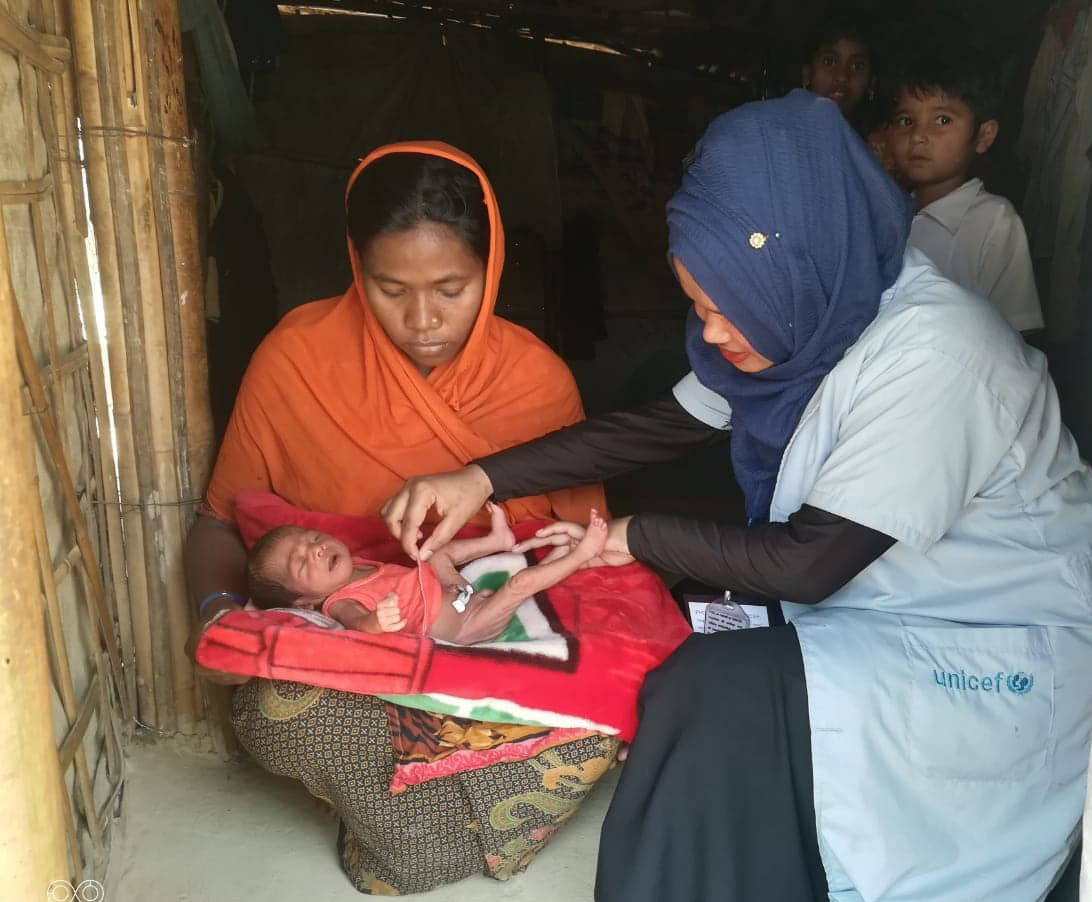|
Project Title: Nutrition Interventions for vulnerable Rohingya and Host Communities in Cox’s Bazaar, in particular Children Under five, Adolescents, Pregnant and Lactating women
Coverage of Areas: Camp 10, Camp 12 and Camp 18 at Ukhiya Upazila
Coverage of Health Facilities: Primary Healthcare Centre (PHC) 096 at Camp 10, Health Post (HP) 117 at Camp 12, Health Post (HP) 183 at Camp 18
Donor : World Bank through UNICEF Bangladesh
Duration: 26 Months (15 January 2020 to 28 February 2022)
Population focus: Under 5 Children, Adolescent boys and girls, Pregnant Women, Lactating Mothers and Caregivers
|

Since September 2017, PHD has been operating nine health facilities in different camps of Ukhiya Upazila jointly with the Health Section of UNICEF Field Office in Cox’s Bazaar. PHD delivers day-time Out-patients’ Maternal Neonatal Child and Adolescent Health (MNCAH) Services through seven Health Posts (HPs), and 24/7 In-patients’ and Out-patients’ MNCAH Services through two Primary Healthcare Centres (PHCs).
Out of the nine health facilities, two HPs and one PHC are supported through a grant from the World Bank. Under a collaborative arrangement with the Nutrition Section of UNICEF Field Office in Cox’s Bazaar, in these 3 World Bank funded health facilities PHD implements nutrition interventions in line with the National Nutrition Service Operational Plan (NNS-OP), particularly for improving Maternal, Infant and Young Child Feeding (M-IYCF) practices.
Objective
Objective of the integrated Nutrition Intervention is to reduce burden of malnutrition among Under 5 Children, Adolescent Boys, Adolescent Girls, Pregnant Women, Lactating Mothers and other vulnerable groups through strengthening and scaling-up of malnutrition prevention interventions
Expected Outputs
- Equitable access to and utilization of quality M-IYCF promotion improved in targeted health facilities with special focus on MNCAH and nutrition for Rohingya refugees
- Equitable access to and utilization of quality M-IYCF promotion improved in community through household level promotion of maternal, neonatal and child health and nutrition for Rohingya refugees
- Effective and efficient program management in place
- Needs which might appear related to Nutrition Interventions during the emergency COVID-19 situation responded immediately through a contingency fund
Key Interventions
- PHD deploys M-IYCF Counsellor in each of the 3 Health Facilities to deliver counselling to Lactating Mothers and Caregivers of children less than two years of age on quality nutrition, to the Pregnant Women and Adolescents Girls on provision of Iron Folic Acid (IFA) and Maternal Nutrition as part of consultation, and to the Pregnant Women and Lactating Mothers on antenatal care (ANC) and post-natal care (PNC).
- PHD engages 80 Community Health Workers (CHWs) under the guidance of 3 Supervisors for increasing awareness among community people in camps through one to one counselling, community gathering and education sessions on ANC and PNC, self-care during pregnancy, essential new-born care (ENC), exclusive breast feeding, supplementary foods, personal health and hygiene, malnutrition, institutional delivery, early marriage, dowry, violence against women (VAW) and children, trafficking etc.
- PHD plans to utilize the contingency fund for improving Infection Prevention and Control (IPC) measures including hand-washing, use of mask, social distancing practices, enhancing maternal nutrition and M-IYCF practices among Pregnant Women and Lactating Mothers, strengthening caregivers’ capacity to provide support to Pregnant Women and Children during quarantine situation, increasing Human Resources, Logistics and Transportation to minimize additional work load, and addressing unforeseen requirements based on situational demands.
|

